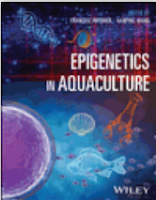Vogt G. 2023. Epigenetics in Crustaceans. In: Piferrer F, Wang H-P (eds.), Epigenetics in Aquaculture, pp. 355-381. https://doi.org/10.1002/9781119821946.ch16
Abstract
This chapter summarizes research on epigenetics in crustaceans and outlines possible applications in crustacean aquaculture. Information on epigenetic mechanisms and their role in gene and phenotype expression, development, ecology, and evolution is mainly available for brine shrimps and water fleas that are cultured as live feed for fish and shellfish larviculture, and for representatives of shrimps, crayfish, and crabs that are cultured for human consumption. The best-investigated crustaceans, with respect to epigenetics, are parthenogenetic lineages of Artemia brine shrimps and Daphnia water fleas and the obligatory parthenogenetic crayfish Procambarus virginalis. Most of the work has been done on DNA methylation followed by histone modifications. The topics studied cover the involvement of epigenetic mechanisms in gene regulation, tissue differentiation, phenotypic variation, development, growth, reproduction, aging, environmental adaptation, resistance to toxicants and pathogens, training of immunity, sex determination, transgenerational inheritance of acquired characters, and speciation. The knowledge gathered has not yet been applied in crustacean aquaculture, but the data suggest that epigenetic interventions have good potential to improve the growth and reproduction of cultured species, manipulate sex, and increase resistance to environmental stressors and diseases.







No comments:
Post a Comment